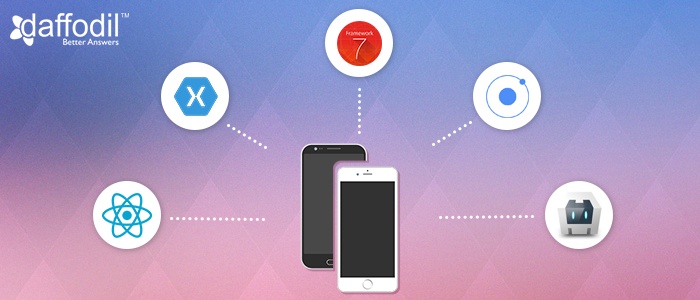
If you are a technology fan, then you must have noticed some new smartphones, tablets, and many other interesting gadgets coming out every month. More the tech-tools with different sizes and software platforms, more are the software applications built for them.
Five years back, who knew that ordering food would be a matter of few taps, writing a document in Word won’t require you to open the laptop, and finding a space on rent wouldn’t call for hopping the entire day. Definitely, an ease has been brought up by the mobile devices and apps that are developed for them.
When it comes to the popular app development platforms, Android and iOS are two dominant players. To reach the targeted users, it is important to prioritize app development for both the platforms. However, this, in some scenarios have got few limitations like development cost for two apps, which platform to choose first for development etc.
Overcoming these restrictions, a number of startups and businesses are opting for cross platform development. This development model is not only reducing the time to receive the output but is also cost-efficient and enables launching an app for both the platforms simultaneously.
All things considered, a number of app development tools and platforms have evolved in the market. These tools are helping developers to build mobile apps for multiple platforms at a time, making way for simplified app development. Let’s take a look at some of the popular and efficient technologies for cross platform app development in 2017.
1. Xamarin
Xamarin has a set of tools to build Android and iOS apps in C#, which includes Xamarin Studio, an add-in for Visual Studio, Xamarin.Android, and Xamarin.iOS. According to Xamarin, their products for app development is being used by 1.4 million developers, in 120 countries (as of April 2017).
Xamarin enables writing native code for Android, iOS, and Windows phone in C# language and offers direct access to the native API on every platform. Anything that’s possible with Objective-C/Swift for iOS and Java for Android can be achieved in C# with Xamarin. Along with this, you can take advantage of C# (which is more performant than Javascript) and .NET libraries for development. Xamarin’s tools compiles C# into native ARM executable format that can further be packaged into an Android and iOS application.
ALSO READ: Reasons to Choose Xamarin for Cross Platform App Development
2. Ionic
Ionic is a framework for hybrid application development by using the web technologies (HTML, CSS, Javascript). It’s the SDK for building apps for multiple mobile platforms simultaneously, with components that ensure native app like experience to the users. For example: Most of the features that you find in a native app like gestures, push notifications, modals, popups etc. are provided with this framework for cross platform app development. Ionic is built with AngularJS, which is a tried-and-tested javascript framework. It works with Cordova to communicate with the device features like GPS, Camera.
It offers some efficient features that makes it possible to develop mobile app in no time. This includes CSS features (buttons, header and footer, form elements, grid system, lists, cards, etc.), Javascript features (Modal, slidebox, action sheet, side menu, complex lists, collection repeat, tabs etc.), and Ionic CLI (issue Cordova commands, Ionic splash, upload app to Ionic view, SASS, access Ionic/io tools etc.).
ALSO READ: Why Ionic is the Most Favorable Hybrid Mobile App Framework
3. React Native
React Native is a javascript framework to develop natively rendering mobile apps for Android and iOS platform. It’s based on React, which is a javascript library by Facebook to build user interfaces, but instead of web, it targets the mobile. To cut short, React Native enable developers to write mobile applications that has got the look and feel of a native app, and all at the comfort of Javascript. Mobile apps that are developed with React Native are a mix of Javascript and XML-esque, known as JSX.
ALSO READ: 10 Apps that are Built using React Native
4. PhoneGap (Apache Cordova)
Adobe PhoneGap is an HTML5 application framework for developing native apps, using web technologies. With their existing know-how of HTML, CSS, and Javascript, developers can build apps that run on smartphones and tablets.
With PhoneGap, you can build hybrid applications, which means they are not based on HTML/Javascript completely, nor they are completely native. Some parts of the mobile app, like UI, communication with server, application logic etc. are based on PhoneGap. Other app that communicates and controls the device is build using native languages.
5. Titanium Appcelerator
Titanium is a product by Appcelerator that allows building mobile apps in Javascript and compiles it into native Android and iOS app. Although, the apps are developed using Javascript, they do not use HTML5 and CSS3. If the look and feel of web page has to be customized, changes in CSS of an object are done. However, if changes in an app element (say button) are to be done, the parameters on the button has to be modified.
When the app developed with Titanium is compiled into iOS or Android, the javascript code is processed into native app project. If Wikipedia sources are to be believed, Titanium have over 950,000 developer registration in the year 2017.
Need to know more about Cross Platform App Development?
Every development model has got its benefits over another. While native apps render an unmatched look and feel, seamless element transitions, efficient performance, and more, developing a cross platform app using hybrid app development model proves to be cost-efficient, open ways to reach the market earlier, and target multiple platforms simultaneously. If you think that abilities of a hybrid app suits your next app development project, then do check our our cross platform app development services.



